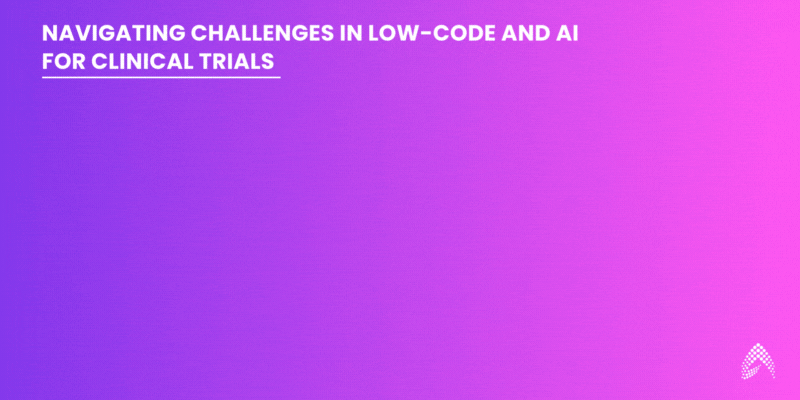Streamlining Clinical Trials with AI & Low-Code

Clinical trials are a critical step in developing groundbreaking treatments, yet they often encounter delays and high costs. These obstacles can hinder the progress of essential medical advancements. Fortunately, the advent of innovative technologies like low-code platforms and AI is transforming this landscape, offering new avenues to streamline and accelerate these vital processes.
Low-code enables rapid application development, while AI provides the intelligence to analyze vast datasets and uncover valuable insights. By combining these technologies, healthcare organizations can accelerate drug development, reduce costs, and improve patient outcomes.
This blog explores how low-code and AI can be leveraged to optimize various stages of clinical trials, from protocol development to data analysis and patient engagement.
Understanding Low-Code and AI
Low-code platforms make it easier and faster to develop healthcare applications. These platforms come with a simple visual interface and pre-made building blocks, allowing both tech experts and beginners to create solutions. This approach speeds up development, cuts costs, and opens up new ways to enhance patient care and streamline operations.
Artificial intelligence (AI) is revolutionizing healthcare by augmenting human capabilities with data-driven insights. In the realm of clinical trials, AI’s potential is vast. From accelerating patient recruitment to optimizing trial design and enhancing data analysis, AI empowers stakeholders with actionable insights. By uncovering hidden patterns and predicting outcomes, AI drives innovation and supports informed decision-making.
The convergence of low-code and AI creates a powerful synergy. Low-code platforms are the base for quickly creating apps powered by AI. AI then boosts these apps by automating tasks, making predictions, and offering smart guidance. This combined approach unlocks the full potential of both technologies, driving innovation and improving clinical trial outcomes.
Low-Code and AI in Clinical Trial Operations
Accelerating Protocol Development
Traditionally, developing clinical trial protocols is a time-consuming process involving multiple stakeholders and complex documentation. Low-code platforms streamline the process of creating and approving clinical trial protocols. For instance, a leading pharmaceutical company reduced their protocol development time by 30% using a low-code solution. By leveraging pre-built templates and drag-and-drop functionality, they quickly created and adapted protocols, allowing them to start trials faster and more efficiently.
AI helps improve this process by looking at past data to find the best practices and suggest ways to make protocols better. It can also predict potential problems and risks, so we can take steps to prevent them early on.
Enhancing Patient Recruitment and Retention
Recruiting and retaining patients for clinical trials is a significant challenge. Low-code platforms can be used to create patient-facing applications for information dissemination, eligibility screening, and appointment scheduling. By simplifying the enrollment process, patient participation can be increased.
AI can play a crucial role in patient identification by analyzing electronic health records (EHRs) to identify potential participants who meet specific criteria. Additionally, AI-powered chatbots can provide personalized support and information to patients, improving their experience and increasing retention rates.
Data Management and Analysis
Clinical trials produce a huge amount of data, much like a library full of books. Just as a librarian organizes books, we need tools to manage and make sense of this data. Low-code platforms can be instrumental in creating data collection forms, electronic case report forms (eCRFs), and data entry interfaces. By automating data capture and reducing manual errors, data quality is significantly improved.
AI can be leveraged to clean and validate data, identifying inconsistencies and outliers. Machine learning algorithms can extract meaningful insights from complex datasets, accelerating data analysis and discovery. Real-time data monitoring with AI-powered dashboards enables researchers to track key metrics and identify potential issues early on. Additionally, low-code platforms can facilitate data integration from various sources, creating a unified view of patient data. This consolidated data can then be enriched with AI-generated insights to inform decision-making.
Streamlining Regulatory Compliance
Clinical trials are subject to stringent regulations. Low-code platforms can help streamline compliance efforts by automating document generation, audit trails, and reporting. By providing a centralized repository for regulatory documents, these platforms enhance transparency and accountability.
AI can contribute to compliance by identifying potential risks and deviations from protocols through anomaly detection and pattern recognition. Additionally, AI-powered chatbots can provide real-time guidance to researchers on regulatory requirements, reducing the risk of errors.
Use Cases: Low-Code and AI in Action
As we’ve seen, low-code and AI can significantly streamline various aspects of clinical trials. Now, let’s look at some real-world examples where these technologies have made a noticeable impact.
- Accelerated Patient Recruitment: Utilizing AI-powered patient matching algorithms to identify eligible participants from large patient databases, coupled with low-code built patient portals for streamlined enrollment.
- Real-Time Data Monitoring: Employing AI-driven analytics on real-time data to detect adverse events early, optimize dosing regimens, and predict patient outcomes.
- Decentralized Trials: Leveraging low-code to create patient-centric applications for remote monitoring and data collection in decentralized trial models.
- Regulatory Compliance Automation: Using low-code to automate document generation, audit trails, and regulatory submissions, while AI assists in risk assessment and compliance monitoring.
These use cases demonstrate how low-code and AI can work together to address critical challenges in clinical trials and drive efficiency improvements.
Navigating Challenges in Low-Code and AI for Clinical Trials

With great power comes great responsibility. What are the main challenges in integrating low-code and AI into clinical trials, and how can we overcome them? Let’s delve into the key hurdles and strategies to address them.
- Data Quality and Integration: Prioritize data cleaning and standardization. Use strong tools to bring together data from different sources and AI to clean up and organize this information. Establish protocols for regular data reviews.
- Change Management: Involve stakeholders early in the process, provide comprehensive training, and emphasize the benefits of the new technologies.
- Data Privacy and Security: Adhere to strict data protection regulations. Implement encryption, access controls, and regular security audits.
- AI Bias and Fairness: Use diverse datasets for training AI models and continuously monitor for biases.
- Regulatory Compliance: Stay updated on regulatory changes and work closely with regulatory bodies to ensure compliance.
- Talent and Expertise: Invest in training and development to build a skilled workforce. Consider partnerships with external experts.
By proactively addressing these challenges, organizations can maximize the potential of low-code and AI in clinical trials.
Conclusion
The convergence of low-code development and artificial intelligence presents a transformative opportunity for the clinical trial landscape. By automating routine tasks, accelerating data analysis, and enhancing decision-making, these technologies can significantly improve efficiency, reduce costs, and accelerate drug development.
From streamlining protocol development to optimizing patient recruitment and retention, low-code and AI offer a comprehensive toolkit for addressing the complexities of clinical trials. While challenges such as data quality, integration, and AI bias must be carefully managed, the potential benefits far outweigh the obstacles.
By embracing these technologies, the healthcare industry can usher in a new era of precision medicine and faster time-to-market for life-saving treatments.
At Amzur Technologies, we’re at the forefront of helping healthcare companies harness the power of these new-age technologies. If you’re interested in learning more about how low-code and AI can transform your clinical trials, subscribe to our blog for the latest insights and updates. For specific requirements or tailored solutions, reach out to us today. Let’s accelerate your journey toward innovation and excellence in clinical trials.

Technical Architect




